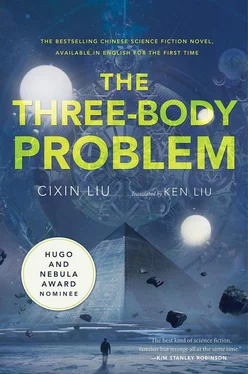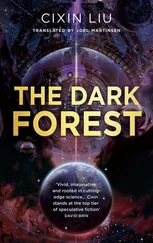“That’s more than enough,” Sha interrupted, waving his hands. “Then you must know that unlike the local variations we observe in different parts of the universe, the overall fluctuation in the cosmic microwave background is correlated with the expansion of the universe. It’s a very slow change measured at the scale of the age of the universe. Even with the sensitivity of the Planck satellite, continuous observation for a million years might not detect any such shift. But you want to see a five percent fluctuation tonight? Do you realize what that would mean? The universe would flicker like a fluorescent tube that’s about to burn out!”
And it will be flickering for me, Wang thought.
“This must be some joke from Professor Ye,” Sha said.
“Nothing would please me more than to discover that it was a joke,” Wang said. He was about to tell Sha that Ye didn’t know the details of his request, but he was afraid that Sha would then refuse to help him.
“Well, since Professor Ye asked me to help you, let’s do the observation. It’s not a big deal. If you just need one percent precision, data from the antique COBE is sufficient.” As he spoke, Sha typed quickly at the terminal. Soon a flat green line appeared on the screen. “This curve is the real-time measurement of the overall cosmic microwave background—oh, calling it a straight line would be more accurate. The temperature is 2.725±0.002K. The error range is due to the Doppler effect from the motion of the Milky Way, which has already been filtered out. If the kind of fluctuation you anticipate—in excess of one percent—occurs, this line would turn red and become a waveform. I would bet that it’s going to stay a flat green line until the end of the world, though. If you want to see it show the kind of fluctuation observable by the naked eye, you might have to wait until long after the death of the sun.”
“I’m not interfering in your work, am I?”
“No. Since you need such low precision, we can just use some basic data from COBE. Okay, it’s all set. From now on, if such great fluctuations occur, the data will be automatically saved to disk.”
“I think it might happen around one o’clock A.M.”
“Wow, so precise! No problem, since I’m working the night shift, anyway. Have you had dinner yet? Good, then I’ll take you on a tour.”
The night was moonless. They walked along the row of antenna dishes, and Sha pointed to them. “Breathtaking, aren’t they? It’s too bad that they are all like the ears of a deaf man.”
“Why?”
“Ever since construction was completed, interference has been unceasing in the observational bands. First, there were the paging stations during the eighties. Now, it’s the scramble to develop mobile communications networks and cell towers. These telescopes are capable of many scientific tasks—surveying the sky, detecting variable radio sources, observing the remains of supernovae—but we can’t perform most of them. We’ve complained to the State Regulatory Radio Commission many times, never with any results. How can we get more attention than China Mobile, China Unicom, China Netcom? Without money, the secrets of the universe are worth shit. At least my project only depends on satellite data and has nothing to do with these ‘tourist attractions.’”
“In recent years, commercial operation of basic research has been fairly successful, like in high-energy physics. Maybe it would be better if the observatories were built in places farther away from cities?”
“It all comes down to money. Right now, our only choice is to find technical means to shield against interference. Well, it would be much better if Professor Ye were here. She accomplished a lot in this field.”
So the topic of conversation turned to Ye Wenjie. And from her student, Wang finally learned about her life. He listened as Sha told of how she witnessed the death of her father during the Cultural Revolution, how she was falsely accused at the Production and Construction Corps, how she then seemed to disappear until her return to Beijing at the beginning of the nineties, when she began teaching astrophysics at Tsinghua, where her father had also taught, until her retirement.
“It was only recently revealed that she had spent more than twenty years at Red Coast Base.”
Wang was stunned. “You mean, those rumors—”
“Most turned out to be true. One of the researchers who developed the deciphering system for the Red Coast Project emigrated to Europe and wrote a book last year. Most of the rumors you hear came out of that book. Many who participated in Red Coast are still alive.”
“That is… a fantastical legend.”
“Especially for it to happen during those years—absolutely incredible.”
They continued to speak for a while. Sha asked the purpose behind Wang’s strange request. Wang avoided giving a straight answer, and Sha didn’t press. The dignity of a specialist did not allow Sha to express too much interest in a request that clearly went against his professional knowledge.
Then they went to an all-night bar for tourists and sat for two hours. As Sha finished one beer after another, his tongue loosened even more. But Wang became anxious, and his mind kept returning to that green line on the terminal in Sha’s office. It was only at ten to one in the morning that Sha finally gave in to Wang’s repeated pleas to go back to the lab.
The spotlights that had lit up the row of radio antennas had been turned off, and the antennas now formed a simple two-dimensional picture against the night sky like a series of abstract symbols. All of them gazed up at the sky at the same angle, as though waiting expectantly for something. The scene made Wang shudder despite the warmth of the spring evening. He was reminded of the giant pendulums in Three Body .
They arrived back at the lab at one. As they looked at the terminal, the fluctuation was just getting started. The flat line turned into a wave, the distance between one peak and the next inconstant. The line’s color became red, like a snake awakening after hibernation, wriggling as its skin refilled with blood.
“It must be a malfunction in COBE!” Sha stared at the waveform, terrified.
“It’s not a malfunction.” Wang’s tone was exceedingly calm. He had learned to control himself when faced with such sights.
“We’ll know soon enough,” Sha said. He went to the other two terminals and typed rapidly to bring up the data gathered by the other two satellites, WMAP and Planck.
Now three waveforms moved in sync across the three terminals, exactly alike.
Sha took out a notebook computer and rushed to turn it on. He plugged in a network cable and picked up the phone. Wang could tell from the one-sided conversation that he was trying to get in touch with the Ürümqi radio astronomy observatory. He didn’t explain to Wang what he was doing, his eyes locked onto the browser window on the notebook. Wang could hear his rapid breathing.
A few minutes later, a red waveform appeared in the browser window, moving in step with the other three.
The three satellites and the ground-based observatory confirmed one fact: The universe was flickering.
“Can you print out the waveform?” Wang asked.
Sha wiped away the cold sweat on his forehead and nodded. He moved his mouse and clicked “Print.” Wang grabbed the first page as soon as it came out of the laser printer, and, with a pencil, began to match the distance between the peaks with the Morse code chart he took out of his pocket.
short-long-long-long-long, short-long-long-long-long, long-long-long-long-long, long-long-long-short-short, long-long-long-short-short-short, short-short-long-long-long, short-long-long-long-long, long-long-long-short-short-short, short-short-short-long-long, long-long-short-short-short.
Читать дальше












